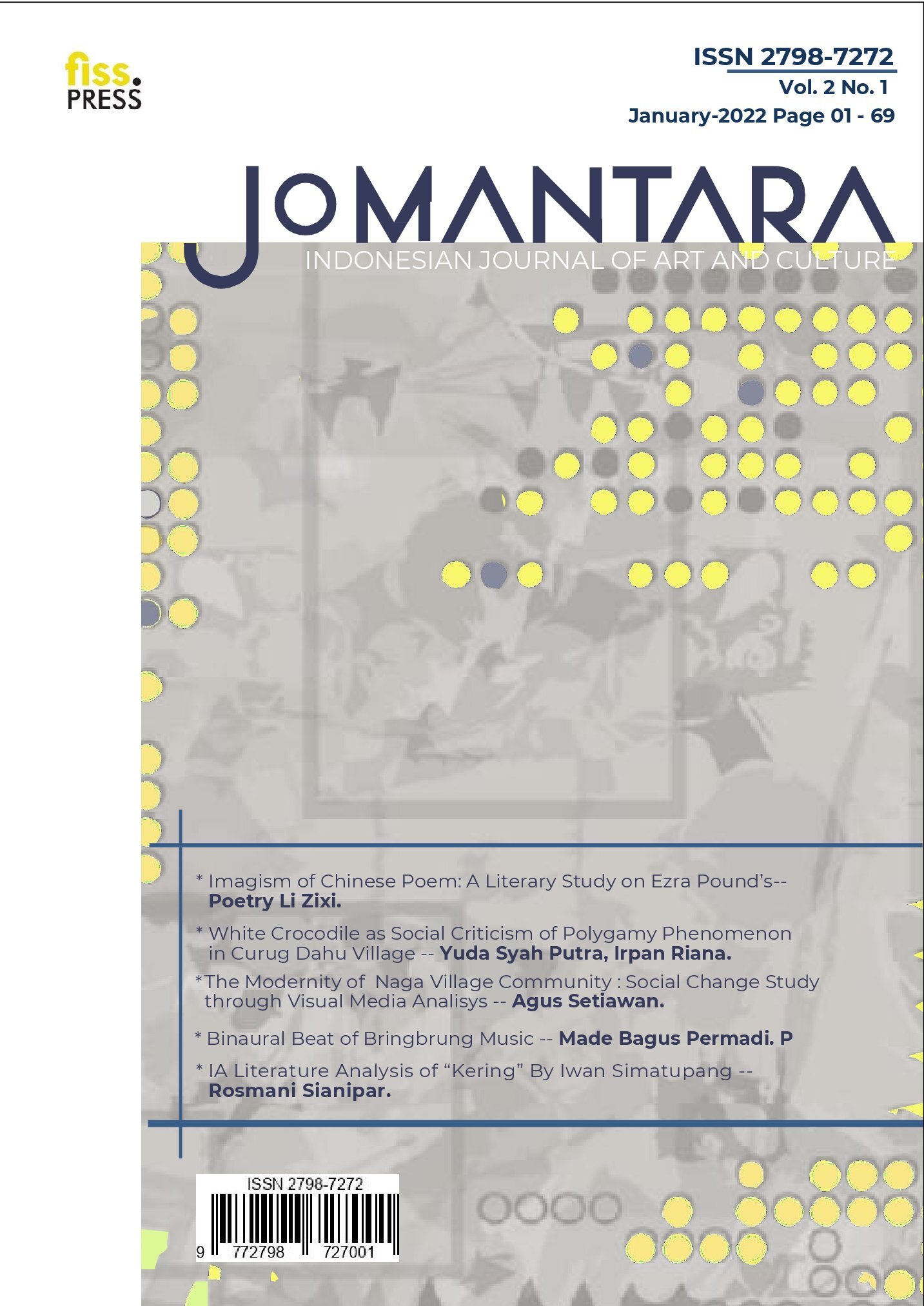The Modernity of Naga Village Community: Social Change Study through Visual Media Analysis
DOI:
https://doi.org/10.23969/jijac.v2i1.4713Keywords:
Cultural change, Kampung Naga, Modernism, Traditional Village, Sunda.Abstract
Looking at the cultural area landscape, Tatar Sunda certainly inherited different rich culture then other regions. Not only inherited tangible cultural wealth but also intangible cultural wealth. However, in the midst of an increasingly advanced civilization, now the Sundanese cultural heritage has changed its existence. Functionally many spiritual traditional cultural products have been replaced by commercial modern cultural products. This fenomenon can be studied from the social changes that occured in Kampung Naga in Tasikmalaya regencies, although in the one hand still maintains its traditional values, on the other hand this traditional village has undergone in many changes. The study intends to determine the existence of Sundanese cultural products, as well as products of national culture in general from the influence of the development of modernism. In addition, by examining the phenomenon of community life in the traditional village of Kampung Naga, it is hoped that the indicators that cause these changes will be known. All objects of this study will be investigated using the qualitative-interpretive methods. This study uses cultural theory, Social Change theory, and semiotic theory as the main reference literature. The data sources used are main (primary) data and secondary data. The main data was obtained directly through interviews with the people of Kampung Naga. Meanwhile, secondary data was obtained from written sources such as: books from previous research, scientific journals, personal documents, photos, statistics, audio and video recordings. Therefore, starting from these initial observations, at least the root cause of social change in Kampung Naga can be described, and its cannot be separated from both internal and external factors behind it, for example: 1) The influence of global modernization, 2) The influence of modernization brought by the people of Kampung Naga who live outside the Traditional Village, 3) The adaptive attitude of the Kampung Naga people living in the Traditional Village. 4) Economic demands and community welfare. These factors are the main source of modernism in Kampung Naga.
Downloads
References
Ratna, Nyoman Kutha, 2010. Metodologi Penelitian: Kajian Budaya dan Ilmu Sosial Humaniora Umumnya, Pustaka Pelajar, Yogyakarta
Piliang, Yasraf Amir, 1999, Hiper-Realitas,Kebudayan, LKIS, Yogyakarta
Soemardjo, Jacob, 2006, Estetika Paradoks, Sunan Ambu Press, Bandung
___________2011, “Asas Tritangtu Kerifan Sunda” Makalah Seminar : Nilai-Nilai Budaya Sunda Masa lampau dalam Era Globalisasi” Bandung, 15 Juni 2011
Sobur, Alex, 2004, Semiotika Komunikasi, Remaja Rosdakarya, Band
Saifuddin, Achmad Fedyani, 2006, Antropologi Kontemporer: Suatu Pengantar KritisMengenai Paradigma, Kencana, Jakarta
Meleong, Lexy, 2010. Metode Penelitian, Kualitatif, Remaja Rosdakarya, Bandun
Endaswara, Suardi, 2003, Metodologi Penelitian Sastra, Epistemologi, Model, Teori dan Palikasi, Pustaka Widyatama, Yogyakarta
Badudu, JS. 2006, Kata-Kata Serapan Bahasa Asing Dalam Bahasa Indonesia, Buku Kompas, Jakarta
Arikunto, Suharsimi. 2002, Prosedur Penelitian: Suatu Pendekatan Praktik, PT. Rineka Cipta, Jakarta.
Chodjim, Achamd, Kosmologi Budaya Sunda, Makalah Seminar : Nilai-Nilai Budaya Sunda Masa lampau dalam Era Globalisasi” Bandung, 15 Juni 2011
Suganda, Her, 2006, Kampung Naga: Mempertahankan Tradisi, Kiblat Buku Utama, Bandung
Stamford Raffles, Thomas, The History of Java, Terjemahan Eko Prasetyaningrum Dkk, Penerbit Narasi, Yogyakarya
Lombard, Dennys, 2005, Nusa Jawa: Silang Budaya, Kajian Sejarah Terpadu, Jilid 1, Gramedia Pustaka Utama, Jakarta
Koentharaningrat, 1993, Manusia dan Kebudayaan di Indonesia, Penerbit Djambatan, Jakarta
Basrowi , 2010 Metode Penelitian Kualitatif Mikro, (G rounded Theory) Fenomenologi, Etnometodologi, Etnografi, Dramaturgi, Interaksi Simbolik, Hermeneutik, Konstruksi Sosial, Analisis Wacana dan Metode Refleksi, Insan Cendekia, Surabaya
Jones, PIP (2010), Pengantar Teori-Teori Sosial: Dari Teori Fungsionalisme hingga Post-Modernisme, Yayasan Obor Indonesia, Jakarta
Sztompka, Piotr, ((2010), Sosiologi Perubahan Sosial, Penerbit Penanda, Jakarta
Ritzer, George (2009), Teori Sosiologi: Dari Teori Sosiologi Klasik Sampai Perkembangan Mutakhir Teori Sosial Postmodern, Kreasi Wacana, Yogyakarta
Downloads
Published
Issue
Section
License
Copyright Notice

This work is licensed under a Creative Commons Attribution 4.0 International License.









